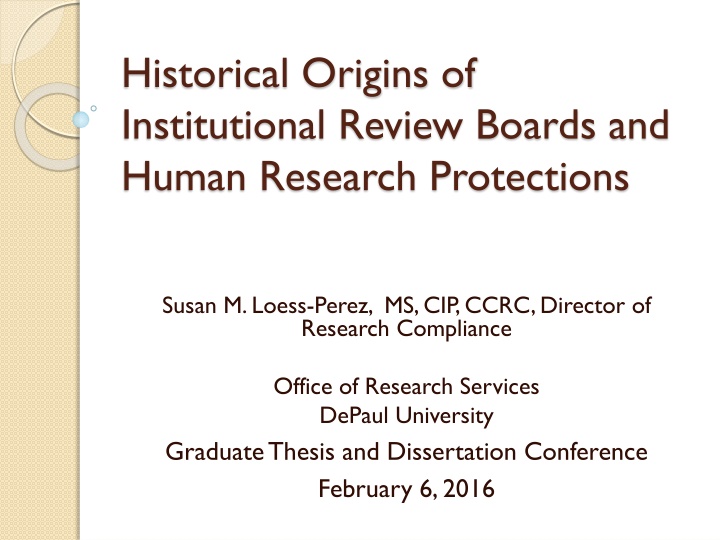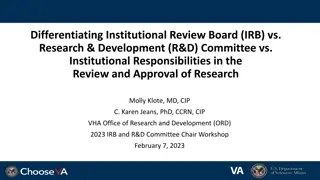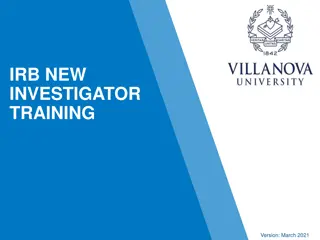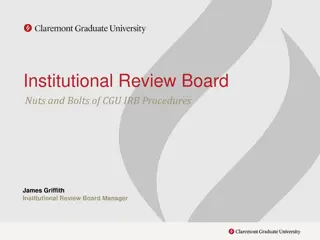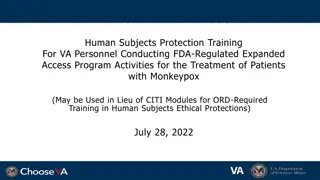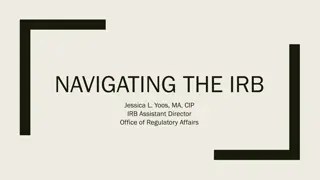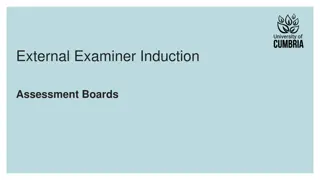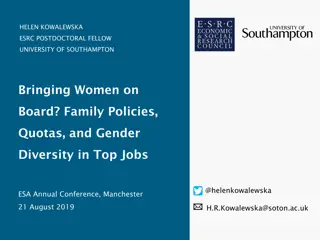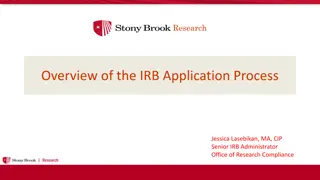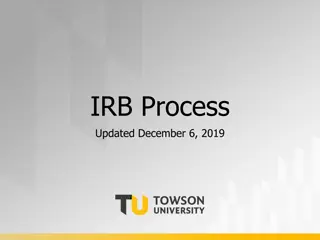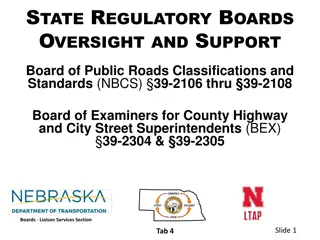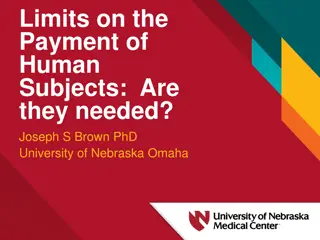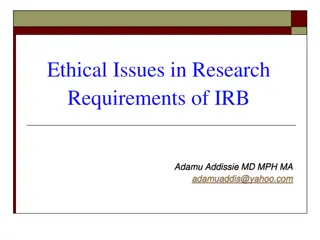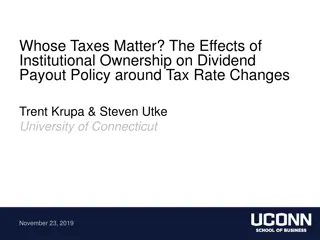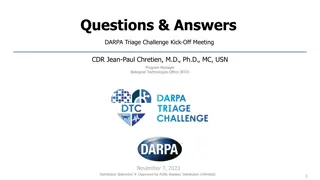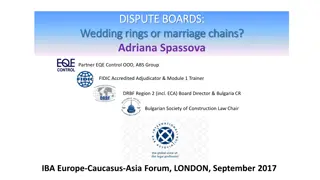Historical Origins of Institutional Review Boards and Human Research Protections
This content delves into the historical origins of Institutional Review Boards (IRBs) and human research protections, touching on significant cases, reactions, the Belmont Report, regulations, and future perspectives. It highlights key events such as the Nazi War Crimes, the Milgram Study, Thalidomide Drug Use, and the U.S. Public Health Service Syphilis Study.
Download Presentation

Please find below an Image/Link to download the presentation.
The content on the website is provided AS IS for your information and personal use only. It may not be sold, licensed, or shared on other websites without obtaining consent from the author.If you encounter any issues during the download, it is possible that the publisher has removed the file from their server.
You are allowed to download the files provided on this website for personal or commercial use, subject to the condition that they are used lawfully. All files are the property of their respective owners.
The content on the website is provided AS IS for your information and personal use only. It may not be sold, licensed, or shared on other websites without obtaining consent from the author.
E N D
Presentation Transcript
Historical Origins of Institutional Review Boards and Human Research Protections Susan M. Loess-Perez, MS, CIP, CCRC, Director of Research Compliance Office of Research Services DePaul University Graduate Thesis and Dissertation Conference February 6, 2016
Outline Historical cases/examples Reactions/results The Belmont Report The Regulations Current perspective What is instore for the future
Timeline of Events 1979 Belmont Report 1981 1962 Kefauver- Harris Amendments DHHS and FDA regulations 1991 Common Rule 1947 1964 Nuremberg Code 1974 NRA Declaration of Helsinki 1930 1940 1950 1960 1970 1980 1990 2000 1963 Milgram Study 1946-47 Nuremberg Doctors trial 1966 Beecher 1999 Jesse Gelsinger Un. Penn. Stanford Prison Study 1971 1946-1948 Guatemala Syphilis Study 1950-60s Thalidomide 1963-66 Willowbrook 1932 Syphilis Study begins 1972 Syphilis Study exposed-1973 stopped 2001 John Hopkins 1944-1974 US Radiation Experiments
Nazi War Crimes Nazi medical experiments Prison camp internees No voluntary consent Vacuum chambers to simulate high altitudes Immersing in ice water or sub-freezing for 12 to 14 hours Wound, burns, amputation, Chemical or biological agents Mortality rates 25-40% Nazi Doctors Trial (1946-1947) Nuremberg Code (1947)
The Milgram Study-Yale (1963) Obedience and response to authority Asked questions - shocked if wrong 60% of subjects were persuaded to give shocks up to the highest level Deception Social psychological risks- extreme psychological stress on subjects
Thalidomide Drug Use and Birth Defects (1950-1960s) Approved European sedative -1950s Not FDA approved in US No damage to mother , but fetus First trimester Led to FDA Drug Amendments Kefauver-Harris Amendments -1962
U.S. Public Health Service Syphilis Study (Tuskeegee) (1932) 200-300 black males age 25 or older Effects of the untreated disease In 1943 penicillin discovered By 1951 penicillin was widely available Expos by Jean Heller 1972 Study not stopped until March 1973
Willowbrook Hepatitis Study (1963- 1966) Willowbrook was a State School for Mentally retarded children. Children injected with live hepatitis virus Parents told - vaccination Example of coercion Enrolled children moved up the list to be eligible for the school Also a vulnerable population
Jewish Chronic Disease Hospital (1963) Cancer-free, severely debilitated patients Injected with live human cancer cells Studying human transplant rejection Oral consent, but patients were not informed Science not understood Doctors thought the cells would be rejected A vulnerable population
Tearoom Trade Study (Mid-1960s) Studied men who had sex in public restrooms Researcher volunteered as look-out Traced license plate numbers Pretended to be a healthcare worker and visited their homes Issues related to privacy, deception, and consent
Henry Beecher New England Journal of Medicine Article (1966) Summarized 22 research studies that involved questionable ethics Included Willowbrook study, Jewish Chronic Disease Study, Transplantation of melanoma from mother to daughter, and a trial with placebo versus penicillin for strep throat (penicillin was standard of care)
Stanford Prison Study (1971) PI Phillip Zimbardo Studied psychological effects of becoming a prisoner or prison guard Of interest to US Navy and Marines to understand conflict between military guards and prisoners Guards enforced authoritarian measures and psychologically tortured prisoners, prisoners accepted the abuse and ultimately harassed other prisoners, and the PI (the jail superintendent) allowed abuse to continue Original theory was inherent personality traits were the cause of abusive behavior, but the actual results showed that the situation rather than the personality cause the issues. PI argued results similar to Milgram study in that normal ordinary people went through these changes, especially since the subjects were chosen as the most psychologically stable and healthy Prisoners not allowed to leave even though told research was voluntary Suggested need for immediate debriefing process
Human Radiation Experiments During Clinton administration (1993) Clinton requested an investigation Hospital patients, children, and soldiers, Often without consent or permission 1944-1974 Congressional report noted 13 more cases Government funding at major universities Created Advisory Committee on Human Radiation Experiments (ACHRE) report Led to National Bioethics Advisory Commission (NBAC)-Replaced by Secretary's Advisory Committee on Human Research Protections (SACHRP)
Guatemala Syphilis Experiments (1946-1948) In 2005 a professor at Wellesley College found documentation of the Guatemalan experiments US Public Health service led experiments with about 1500 soldiers, prostitutes, and prisoners, and mental patients infecting them with syphilis and other sexually transmitted diseases. Infected prostitutes paid to have sex with prisoners. In 2010, the US government formally apologized In 2011 Presidential Commission found, the experiments involved unconscionable basic violations of ethics as judged against the researchers own recognition of medical ethics of the day.
Other more recent cases University of Pennsylvania Gene Transfer Experiment (1999) Jesse Gelsinger, age 18, dies as result of gene transfer study The PI and the institution Significant financial interests Conflict of interest now in the fore front John Hopkins Healthy Subject Death (2001) Healthy female volunteer age 24 - Died No IND Approved as tablet - Approval withdrawn New use inhaled - never been used Inadequate risk disclosure Failure to report unanticipated problems Revisions to the protocol - no IRB approval Investigators failed to resolve problems with one subject before enrolling and treating another
Wikipedia List of additional unethical research in US history https://en.wikipedia.org/wiki/Unethical_hu man_experimentation_in_the_United_St ates
Timeline of Events 1979 Belmont Report 1981 1962 Kefauver- Harris Amendments DHHS and FDA regulations 1991 Common Rule 1947 1964 Nuremberg Code 1974 NRA Declaration of Helsinki 1930 1940 1950 1960 1970 1980 1990 2000 1963 Milgram Study 1946-47 Nuremberg Doctors trial 1966 Beecher 1999 Jesse Gelsinger Un. Penn. Stanford Prison Study 1971 1946-1948 Guatemala Syphilis Study 1950-60s Thalidomide 1963-66 Willowbrook 1932 Syphilis Study begins 1972 Syphilis Study exposed-1973 stopped 2001 John Hopkins 1944-1974 US Radiation Experiments
Nuremberg Code 1947 10 items in the Code Voluntary consent essential For good of society not possible by other methods Based on animal studies or other evidence Designed: avoid unnecessary suffering/injury Do not conduct if death or disability may occur
Nuremberg Code 1947 (cont) Degree of risk not to exceed importance of problem Proper preparations and adequate facilities to protect against injury, disability, or death Scientifically qualified persons Subject should be able to stop Scientist should be prepared to stop
Declaration of Helsinki- 1964 Expands upon principles in Nuremberg Code But again, only medical research Introduces ethical guidelines: Written protocol Ethical review board review Ongoing monitoring Awareness of undue duress LAR for mentally incapable or minor subjects Relaxes consent requirement from Nuremberg Code Minor assent
Belmont Report 1974 National Research Act regulations informed consent and review by IRBs Established the National Commission for the Protection of Human Subjects of Biomedical and Behavioral Research 1979, Belmont Report. 1981: DHHS and FDA regulations Based upon Belmont Report 1991 The Common Rule
Belmont Report Respect for Persons Informed consent Beneficence Do not harm, maximize benefits, minimize risks Justice Selection of subjects
Regulations Code of Federal Regulations (CFR) 45, Part 46 http://www.hhs.gov/ohrp/humansubjects/guidance/45c fr46.htm FDA-CFR 21, Parts 50, 56 http://www.fda.gov/oc/gcp/regulations.html
Parts of the Federal Regulations Subpart A Exemptions, IRB membership and procedures, IRB responsibilities, informed consent Subpart B- Special protections for pregnant women, human fetuses, and neonates Subpart C- Special protections for prisoners Subpart D-Special protections for children Subpart F (New)- IRB registration
The Purpose of the IRB A committee that has been formally designated to approve, monitor, and review biomedical and behavioral research involving humans with the aim to protect the rights and welfare of the research subjects.
Current Perspective- Human Subject Protection Program Human Subjects Protection Program FWA Institution Office of Research Services Institutional Review Board Researchers Support Offices ORS-Grants and Contracts Compliance Billing General Counsel Local Review Boards/Departmental Review
What is instore for the future? Advanced Notice of Proposed Rule Making (ANPRM)-July 26, 2011 Notice of Proposed Rule Making- September 8, 2015- deadline for comments January 6, 2016
Contact Information Office of Research Services DePaul University 1 East Jackson Blvd. Chicago, IL 60604 Office Location: 14 E. Jackson, Suite 1030 General Research Protections Email box: ORP@depaul.edu IRB Webpage: https://offices.depaul.edu/ors/research- protections/irb/Pages/default.aspx Susan Loess-Perez Phone: 312-362-7593 Email: sloesspe@depaul.edu
